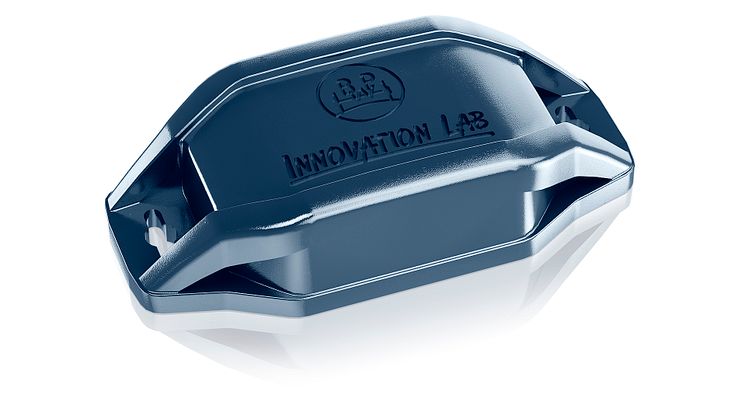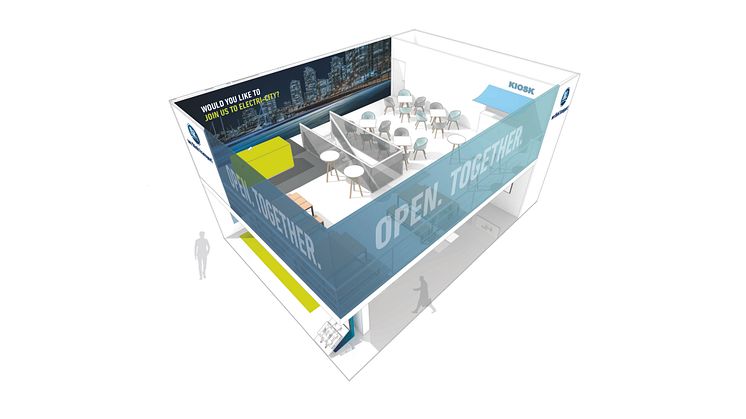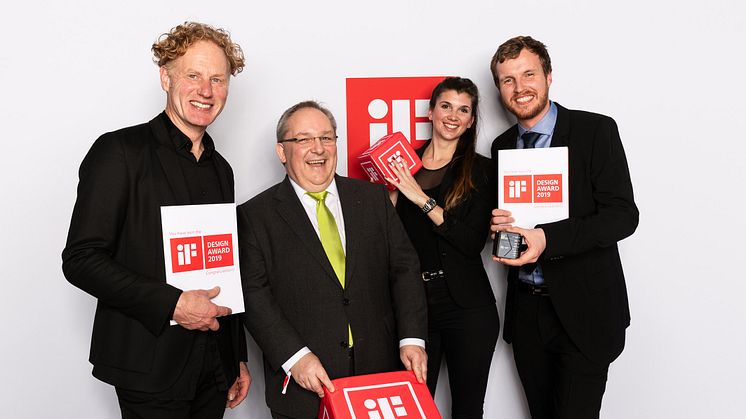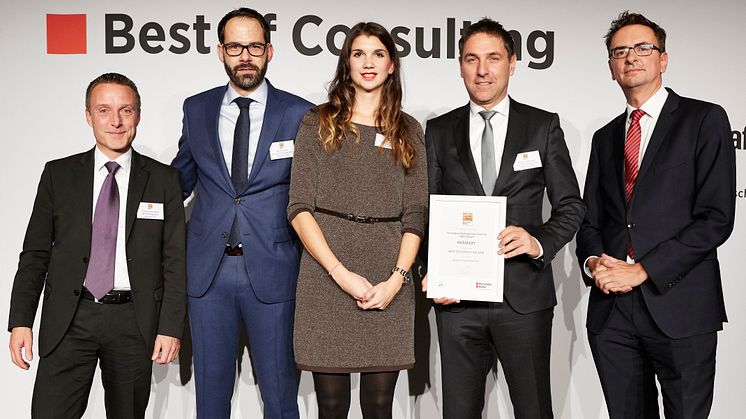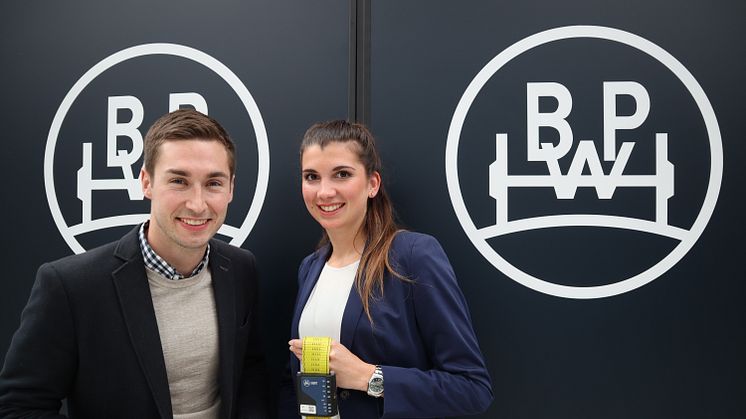
Press release -
BPW receives German Innovation Awards for digital cargo securing and freight tracking – two key technologies for autonomous transport
- Gold German Innovation Award for the BPW iGurt, a digital cargo securing system that prevents millions in damage and is paving the way towards autonomous transport
- BPW CargoTracer, the first digital cargo tracking system that everyone can afford, wins multiple awards
- BPW successfully relies on young innovation teams and agile development methods
Wiehl, 29 May 2019 --- BPW is giving cargo a voice using sensors and digital connectivity – the iGurt indicates whether it is correctly secured in the drawbar trailer during the journey, while the CargoTracer connects it directly with senders' and recipients' merchandise management systems. And these solutions, which offer hauliers and logistics companies new security and efficiency gains today, already contain key technologies required for autonomous transport. For these achievements, BPW has now received three German Innovation Awards.
As a leading specialist for technologies and mobility solutions in the commercial vehicle industry, the BPW Group operates two innovation laboratories: one dedicated to mechatronics, and one to the Internet of Things. The young innovation teams work closely with vehicle manufacturers, hauliers and shippers to develop new transport applications, and their efforts are quite successful. Using agile methods, they have brought new ideas to market in record time – and are winning one important innovation award after another as a result. As such, BPW’s intelligent load securing system iGurt recently received the German Innovation Award in ‘Gold’ in the ‘Excellence in Business to Business – Automotive Technologies’ category. The iGurt is particularly worth its weight in gold for hauliers, who have to claim transport damages of around 1.2 billion euros annually from their insurance companies. Inadequately secured cargo can not only fall over, it can even cause the entire drawbar trailer to lurch from side to side and tip over, causing devastating accidents. Up until now, truck drivers have only secured their cargo on the basis of their their instincts and visual judgement. If the strap is too tight, however, it can damage the cargo. If it's too loose, it can start to slip and come completely detached from the lock. Katharina Kermelk (30), a product manager at BPW’s Innovation Center for Mechatronics in Wiehl, Germany, is now giving the lashing strap a voice: an easy-to-use, robust sensor fastened to the strap displays the preload directly on the housing by means of an LED and transmits it to an app on the driver’s mobile phone while driving. Both the iGurt and the app are extremely intuitive – and can be connected to telematics systems in the future. This means that the haulier will also be able to track and document cargo securing remotely.
The iGurt still has tremendous potential for the future, as Katharina Kermelk reveals: ’The iGurt could considerably simplify load securing checks by the police, for example. It is conceivable that trucks equipped with the iGurt could be inspected and waved through remotely. And digital cargo securing is also necessary for autonomous transport – when trucks drive themselves, the cargo must also be able to monitor itself, report on its own and most importantly, stop the vehicle in the event of an emergency. This is also why the iGurt has attracted a great deal of interest from research institutions and innovation laboratories in the vehicle and insurance sectors that are working on the autonomous transport system of the future.’
But as Alexander Lutze (30) is convinced, autonomous cargo must come before autonomous driving. As head of the BPW Innovation Lab in Siegburg, he looks at the transport route from the perspective of senders and their ERP and merchandise management systems. Up to now, their ability to track and manage their cargo has literally ended at the factory gate. This is why Mr Lutze worked with senders to develop an ‘Internet of Transport’ in which the goods remain in constant contact with ERP and merchandise management systems like SAP while on their way from A to B. This system is what gives senders the ability to track the flow of goods across different locations. This is made possible by a small, robust sensor attached to the cargo carrier or the cargo itself. It uses an innovative ultra narrowband network to transmit location, temperature and vibration data. Since the CargoTracer works without expensive and power-hungry mobile radio technology, it makes cargo tracking affordable for the first time. The battery lasts up to five years. For the jury of the German Innovation Award, this solution deserved two awards: the CargoTracer was named the winner in the ‘Excellence in Business to Business – Logistics & Infrastructure’ and ‘Design Thinking’ categories.
The German Innovation Award is presented by the German Design Council to groundbreaking innovations that have a lasting effect and offer users real added value.
‘The submitted innovations are evaluated with a focus on user-centricity. It is the distinguishing feature of the German Innovation Award,’ explains Andrej Kupetz, managing director of the German Design Council. ‘This is especially successful if future users are involved in product and design development at an early stage.’
The German Innovation Award’s evaluation criteria include aspects such as the level of innovation, user benefit, and cost-effectiveness. The winners were chosen by a jury of distinguished experts – including physicists, patent consultants, computer scientists, financing specialists, product designers, technology historians and marketers. ‘This is how we guarantee an individual, neutral and professional assessment,’ emphasises Kupetz.The German Innovation Award was initiated and implemented by the German Design Council, which was established by German parliament in 1953 and funded by the Federation of German Industries (BDI). The foundation’s mission is to enhance the competitiveness of German companies, which it has been pursuing for 66 years now.
Topics
Categories
About BPW Bergische Achsen Kommanditgesellschaft
BPW Bergische Achsen Kommanditgesellschaft is the parent company of the BPW Group. With over 1,600 employees, including around 120 trainees, the family-owned company has been developing and producing complete running gear systems for truck trailers and semi-trailers at its headquarters in Wiehl since 1898. BPW’s technologies include axle systems, brake technology, suspension and bearings. BPW’s trailer axles and running gear systems are in use in millions of vehicles around the world. An extensive range of services also offers vehicle manufacturers and operators the ability to increase the efficiency of their production and transport processes. www.bpw.de/en
About the BPW Group
The BPW Group researches, develops and manufactures everything needed to ensure that transport keeps moving and is safe, illuminated, intelligent and digitally connected. With its brands BPW, Ermax, HBN, HESTAL and idem telematics, the company group is a preferred system partner of the commercial vehicle industry around the globe for running gear, brakes, lighting, fasteners and superstructure technology, telematics and other key components for trucks, trailers and buses. The BPW Group offers comprehensive mobility services for transport businesses, ranging from a global service network to spare parts supply and intelligent networking of vehicles, drivers and freight. The owner-operated company group currently employs 7,200 staff in more than 50 countries and achieved consolidated sales of 1.48 billion euros in 2017. www.bpw.de/en



